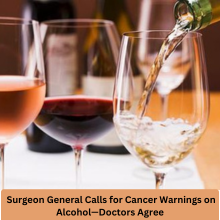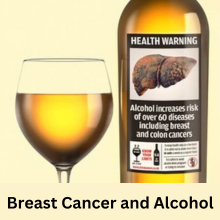
In a groundbreaking move, the U.S. Surgeon General recently suggested that alcoholic beverages should carry cancer warning labels. This new report has been long awaited, with medical professionals expressing that this overdue action is vital in informing the public about the clear risks associated with alcohol consumption. For years, the medical community has known about the links between alcohol and various cancers, but many consumers remain unaware. This new recommendation is designed to address that gap and promote better health awareness.
The Science Behind Alcohol and Cancer
Alcohol consumption is linked to an increased risk of several types of cancer. According to the latest research, alcohol use has been associated with cancers of the mouth, throat, esophagus, larynx, liver, breast, and colon. But why exactly does alcohol raise the risk of these cancers?
As alcohol breaks down in the body, it damages DNA and proteins, which can lead to mutations that allow cancer to develop. Furthermore, alcohol alters hormone levels, which can increase the likelihood of certain cancers, especially breast cancer. It also makes it easier for the body to absorb other carcinogens, like tobacco smoke, further compounding the risks. The evidence linking alcohol to cancer is solid, and the Surgeon General’s new report highlights these scientific findings.
Surgeon General’s Key Recommendations
In his report, Surgeon General Vivek Murthy calls for clearer public health messaging about alcohol’s risks. His most notable recommendation is that alcoholic beverages should carry warning labels, similar to the warning labels on tobacco products. This would ensure that consumers are informed about the potential cancer risks associated with drinking.
Additionally, Murthy suggests reassessing the current limits for alcohol consumption. The U.S. guidelines on how much alcohol is safe to consume have been debated for years, and this report challenges the status quo, encouraging a reevaluation of the recommended limits.
Why Public Awareness on Alcohol and Cancer is Lacking
Despite years of evidence linking alcohol to cancer, public awareness remains low. This lack of awareness can be attributed to several factors, including the pervasive role alcohol plays in social and cultural customs. Drinking is often seen as a normal, even celebratory part of life, making it difficult to raise awareness about its potential health risks.
Furthermore, alcohol-related cancer risks have not been as prominently featured in public health messaging as the risks of smoking or obesity. This has led to a significant gap in the understanding of alcohol’s health dangers, particularly among the general public.
Insights from Medical Experts
The American Medical Association (AMA) has long advocated for clearer messaging about the health risks of alcohol. According to Dr. Bruce Scott, president of the AMA, alcohol consumption at any level, not just heavy or addictive drinking, is a modifiable risk factor for cancer. This means that even moderate drinking can increase one’s risk of cancer, yet many individuals remain unaware of this connection.
Dr. Rotonya Carr, a leading gastroenterologist at the University of Washington, emphasizes that the public has not been adequately informed about alcohol’s cancer risks. She believes that the Surgeon General’s report is an important step toward improving education on this issue.
Is There Any Safe Level of Drinking?
This is one of the most crucial questions raised by the Surgeon General’s report: Is there any safe level of alcohol consumption? According to the World Health Organization (WHO), there is no safe amount of alcohol consumption when it comes to cancer risk. Even low levels of alcohol can damage cells and increase the likelihood of developing cancer.
Dr. Paul Gilbert, an associate professor at the University of Iowa, states that the safest approach for overall health is to avoid alcohol entirely. However, he acknowledges that alcohol is deeply embedded in social and cultural practices, making complete abstinence a difficult choice for many.
Also read: Starbucks Brings Back Fan-Favorite Pastry – Hurry, Limited Time
Alcohol and Cancer Risk by the Numbers
Statistics provide a clearer picture of how alcohol consumption increases cancer risks. A 2020 study revealed that women who consumed less than one drink per week had a 17% risk of developing alcohol-related cancer in their lifetime. However, this risk increased to 22% for those who drank two or more drinks daily. For men, the risk rose from 10% to 13% under similar consumption patterns.
These numbers demonstrate that even moderate alcohol use can contribute to an increased risk of developing cancer.
Alcohol vs. Other Cancer Risks: How Does It Compare?
Alcohol is the third leading preventable cause of cancer in the United States, behind tobacco use and obesity. The Surgeon General’s report estimates that alcohol is responsible for nearly 100,000 cancer cases and around 20,000 cancer-related deaths every year in the U.S.
In fact, the WHO classifies alcohol as a “Group 1” carcinogen, placing it in the same category as tobacco and asbestos. This classification highlights the well-established connection between alcohol and cancer, yet many people remain unaware of the serious risks associated with drinking.
Public Health Messaging: A Missed Opportunity
Despite the overwhelming evidence, public health messaging about alcohol’s cancer risk has been minimal. This lack of effective communication has contributed to a public perception that alcohol consumption is not as dangerous as smoking or other risky behaviors. Dr. Carr believes that this represents a significant missed opportunity to educate the public and reduce alcohol-related cancers.
The Impact of Alcohol on Different Types of Cancer
Alcohol consumption is linked to a variety of cancers, each affecting different parts of the body. Let’s take a look at the types of cancers most strongly associated with alcohol.
Breast Cancer and Alcohol
Alcohol is one of the leading risk factors for breast cancer, especially among women. Studies have shown that even moderate alcohol consumption can increase the risk of developing breast cancer. This risk is higher for women who drink regularly, with heavy drinking leading to a significantly higher chance of developing the disease.
Colon and Liver Cancer: The Connection to Alcohol
Alcohol consumption also plays a key role in the development of colon and liver cancers. Chronic alcohol use can lead to liver cirrhosis, which increases the likelihood of liver cancer. Similarly, alcohol’s impact on the digestive system can raise the risk of developing colon cancer, particularly in individuals with a family history of the disease.
The Role of Alcohol in Other Cancers
Alcohol consumption is also linked to cancers of the mouth, throat, esophagus, and larynx. Drinking increases the risk of developing these cancers, particularly when combined with smoking, as the two substances act synergistically to damage cells in the body.
Dr. Vivek Murthy’s Recommendations: What Should Change?
Dr. Murthy’s recommendations are clear: we need to rethink how we approach alcohol consumption and cancer risk. This includes labeling alcoholic beverages with cancer warnings and revising the current guidelines on alcohol consumption to reflect the growing body of evidence about its health risks.
Also read: Is Bitcoin’s $92K Drop the Beginning of a Bigger Crash?
Conclusion
The Surgeon General’s suggestion to put a cancer warning on alcoholic beverages is an important step toward reducing alcohol-related cancer cases. While alcohol is deeply ingrained in our social fabric, it’s crucial to acknowledge and address the serious health risks it poses. By raising awareness and implementing changes in public health messaging, we can reduce alcohol-related cancer rates and promote healthier lifestyles.
FAQs
Is alcohol consumption safe in moderation?
While moderate drinking may seem harmless, it still increases the risk of certain cancers. The safest option is to avoid alcohol entirely.
How does alcohol specifically affect breast cancer?
Alcohol can increase estrogen levels, which is a known risk factor for breast cancer, especially in women who drink regularly.
Why has alcohol’s cancer risk been under-addressed?
Alcohol is deeply embedded in cultural and social practices, and public health messages about its risks have not been as prominent as those about tobacco.
How can we raise awareness about alcohol-related cancer risks?
Public health campaigns, warning labels on alcoholic beverages, and education from medical professionals can help increase awareness.
What other lifestyle changes can reduce cancer risks?
Along with reducing alcohol consumption, maintaining a healthy diet, regular exercise, and avoiding smoking can significantly lower the risk of developing cancer.

